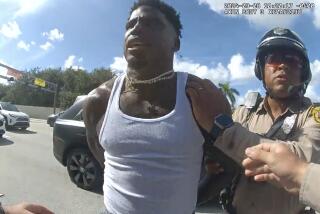Surgeon Says Rampart Officers Injured Him
A Florida surgeon accused Rampart Division police officers Tuesday of pulling him over on the Santa Monica Freeway last month because he is black and handcuffing him so tightly that he suffered nerve damage in his wrists.
Dr. Angelo E. Gousse, a urology specialist who also teaches at the University of Miami medical school, filed a claim Tuesday against the Los Angeles Police Department, accusing officers of racial profiling and excessive force. He said he can no longer perform surgeries or drive because of injuries he suffered the night of Feb. 11.
“I was humiliated,” Gousse, a 37-year-old Haitian immigrant, said at a downtown news conference. “It was a horrifying experience, a nightmare in Los Angeles.” Gousse said he was released about four hours later with no apology.
Lt. Horace Frank, an LAPD spokesman, said he could not comment on the claim because he has not seen it. Any complaint of racial profiling, he said, would automatically be forwarded to the department’s Internal Affairs unit for investigation. Racial profiling, he said, “is a violation of department policy and is against city law.”
Gousse said he was in town that night to give a talk at UCLA Medical Center and was driving to his hotel near Los Angeles International Airport when officers stopped him sometime before 10 p.m.
He said his Budget rental car, a 2000 Ford Taurus, was surrounded by numerous LAPD patrol units, as a police helicopter flew overhead. He recalled that officers ordered him to get out of the car and lie on the pavement. “What did I do wrong?” he said he asked repeatedly, adding that officers didn’t respond.
“ ‘I’m a physician,’ I told them, but it didn’t make any difference to them,” he said. “It was like I was talking to the pavement.”
When officers handcuffed him, Gousse said, he complained that the cuffs were too tight. No one offered to loosen them, he said, adding that he still was not told why he was in custody when he was driven to the Rampart station.
He said he repeatedly asked where he was while complaining of numbness in his hands. Gousse recalled that one unidentified officer at the station eventually answered him, saying, “Hey, you’re in Los Angeles, California.”
Gousse said he was released before 2 a.m.
It is unclear where the incident occurred and why Rampart officers stopped Gousse on the freeway, which was presumably several miles away from their station.
Santa Monica attorney Browne Greene, who is handling the claim, said he didn’t know but offered one explanation from an LAPD official he said he talked to: The Rampart officers were on their way to the 77th Street Division station when they saw something amiss with the registration tags on Gousse’s car, prompting them to pull him over.
That, Greene said, doesn’t explain why the officers took his client to the Rampart station or why it took so long to release him.
“This type of conduct is all too familiar” within the LAPD, especially in view of the Rampart scandal, Greene said.
A federal lawsuit filed last year, which accused the LAPD of illegally targeting members of minority groups for vehicular stops, is being settled before it goes to trial. The suit was filed on behalf of five men who told stories similar to Gousse’s, said attorney Catherine Lhamon of the American Civil Liberties Union of Southern California.
Another federal suit was filed by an African American judge who alleges that she was forced to lie on hot asphalt in Venice for 30 minutes last summer after being stopped by LAPD officers.
A bill by state Sen. Kevin Murray (D-Culver City), an African American lawmaker who was pulled over in 1998 by Beverly Hills police, would require all California law enforcement agencies to study whether profiling occurs.
Los Angeles, meanwhile, has 45 days to rule on Gousse’s claim. If it is rejected, Gousse can sue in Superior Court, Greene said.
*
Staff writer John Allman of the Sun-Sentinel in Fort Lauderdale, Fla., contributed to this story.
More to Read
Sign up for Essential California
The most important California stories and recommendations in your inbox every morning.
You may occasionally receive promotional content from the Los Angeles Times.









